Dr Leah Torres doesn’t tell people what she does when she meets them, which makes it hard to make friends. She removes her name from every piece of trash before she puts it out for recycling, in case people walking past see her name and find out where she lives. If a package addressed to her arrives on her porch, she calls everyone she knows to identify who sent it before she opens it – it could be a bomb.
Once, coming back from work in the piercing August Alabama sun, she noticed a gray sedan parked in her driveway. Instinctively, she fled to a neighbor’s house – she barely knew him – but asked if he could walk her home anyway. The car turned out to be a stranger’s; the driver had just pulled over to send a text message. “Still, you never know,” says Torres, her big, almond-shaped eyes conveying concern.
She’s not paranoid. Torres is an abortion doctor in the state of Alabama, where abortion is now illegal except in life-threatening situations. She’s one of the many doctors increasingly targeted by lawmakers, protesters, conservative news outlets and social media, even more so now that abortion is no longer legal in much of the US.
People hate Torres. They have filmed her outside her place of work and posted videos of her online. They approach her sometimes knowing her first name, her car and what time she gets to work in the morning, while she knows nothing about them.
When we first meet at the West Alabama Women’s Center in Tuscaloosa, where she works, an anonymous person has just sent her a card with a mirror inside. Inside, it reads: “She’s a 10. But she needs to find a new job.” It’s tame in comparison to what some who have worked at the clinic have received in the mail; the former owner was sent anthrax.
Torres has long been in the public eye. As a proud, loud abortion provider who is well known on social media, she has made many enemies. But since the state of Alabama took her medical license away, dragging her through a $115,000 legal battle that put her out of work for seven months, fear follows her around, like a stranger ready to snatch her in the night.
It was 11am on a Thursday when two men presented themselves in the lounge of the West Alabama Women’s Center, asking to see the clinic’s doctor. Torres led the two men down the hall to one of the center’s offices. Inside, the air was stuffy, the windows carpeted by heavy 1940s drapes that deny all sun – a helpful privacy feature.
The men revealed themselves to be investigators sent by the state. One solemnly informed Torres of her predicament: she was being stripped of her license to practice medicine, pending an investigation by the Alabama board of medical examiners.
Torres was being accused of fraud. Scott Sides, one of the investigators, informed her she had made errors in her application for a medical license. The hearing was set for 21 December 2020, four months in the future, when she would be able to argue her case. Until then, she couldn’t practice as a doctor.
“That’s too far out,” she said, the first note of panic registering in her otherwise calm demeanor. “For my livelihood,” she clarified, more deep-set in tone.
Investigator Sides’ voice sounded gentle, even apologetic, as he informed her that she would have to complain through an attorney if she wanted her hearing moved closer.
Torres noticed Sides’ hands – soft-skinned, supple, a bureaucrat’s hands – were shaking as he handed her the papers to sign. The whole process struck Torres as strange; she had read about doctors accused of sex offenses in her state who had not been suspended before an investigation confirmed their guilt.
“I think he knew what he was doing was wrong,” Torres says now.
The officers left, but not before taking Torres’ physical license with them.
“I felt like a child being reprimanded,” she says.
Sides informed the clinic that no patients were to be seen until a covering physician was hired to replace Torres, the clinic’s only doctor, unless her license was reinstated.
And so began Torres’ battle with the state, and the clinic’s fight for survival.
The West Alabama Women’s Center, a fubsy, brick building bedecked with brown leather armchairs and dark oak cabinets, was – until relatively recently – the busiest abortion clinic in all of Alabama. A two-hour drive from Alabama’s border with Mississippi, its geographic position made it a safe haven for residents traveling from that state, which only had one clinic serving its childbearing-age population of about 600,000 since 2018.
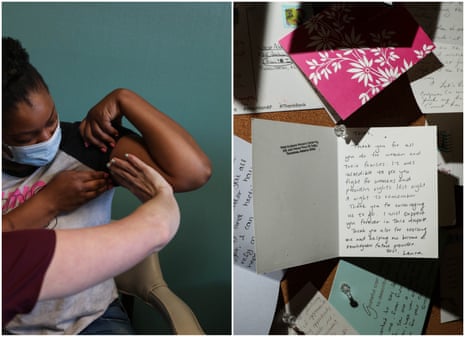
“I assumed most of the patients would be students from the university, seeing as it’s in a university town,” says Wendy Rawlings, who volunteered as an escort at the clinic between 2017 and 2020. But they weren’t.
Historically, most of the clinic’s patients have been Black and low-income. Many were mothers unable to take on the financial burden of a new baby (most people who have an abortion already have children). Less often, they were teenagers who didn’t want to drastically change their life’s course to become a parent.
Rawlings’ job was to escort patients from the parking lot to the clinic safely – a small stretch of land that takes no more than a minute or two to walk across, but a necessary requirement nonetheless. She tried to shield them from the protesters hurling abuse or begging them to change their minds about their abortion as they entered the clinic.
As a volunteer, Rawlings met patients who had disabled children and couldn’t take on the extra burden of a new baby; women with chronic pain conditions like sciatica that made it hard to fathom the physical load of chasing a toddler; patients with drug problems who knew birth would land them in jail and their child in foster care; women in violent relationships; rape victims; or people whose pregnancy was a threat to their life for medical reasons.
She enjoyed the work. She knew she couldn’t totally shield people from what she calls “the humiliation, the brutality of being lectured through a bullhorn [by protesters] who don’t know you”. But she sensed she provided a much-needed buffer.
Alongside the conviviality between escorts and patients, though, was the harassment. Four years after it opened in 1997, the clinic was subject to an arson attack. It was razed to the ground, reopening in the same nondescript business park.
The clinic has been threatened countless times, and even shot at. In 2006, an anti-abortion advocate drove his Nissan Sentra through the building’s front doors and into the waiting room in the early hours of the morning before patients arrived. The culprit said he didn’t want to harm anyone, although he probably wanted to put the clinic out of operation.
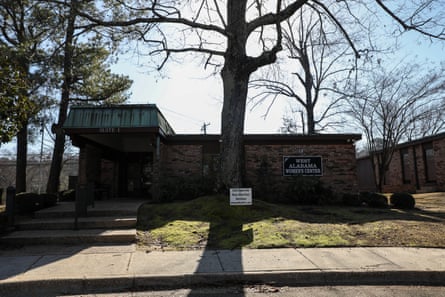
Then came the onslaught of anti-abortion legislation in Alabama in the late 2000s, which almost shuttered the center. A law requiring hospital permitting privileges for abortion clinics closed the facility for the best part of 2018. There were laws that regulated the use of medication abortion in the clinic, and laws that required a $150,000 ambulance ramp to be fitted to the back of the building (hospitalization is an incredibly rare occurrence).
It was a slow, protracted attack by a thousand laws, regulations and expensive emergency fittings. Owner Gloria Gray would often mentally set a date at which time she’d have to close to clinic for good, she explained in a 2016 documentary. But when that date arrived, she said, “my heart wouldn’t let me do it.”
In 2018, Gray, who was then 69, was ready to retire. In order to do so, she needed someone to buy the clinic. It was a struggle. Abortion clinics are not the most lucrative, nor the easiest, businesses to run, with the onslaught of attacks, the daily gamut of protesters and the ever-shifting rules and regulations.
A bill aimed at banning abortion in the entire state of Alabama was what finally led to her finding a buyer.
Alabama’s Human Life Protection Act – a total ban on abortion without any exceptions – started making its way into law. In May 2019, the bill passed.
The law was unenforceable at the time, because abortion then remained a federal right. But the first and only outright abortion ban being passed in the country resulted in a moment of outcry.
“Literally from the second the bill was signed, there was so much anger and confusion. Bernie Sanders got involved. Pussy Riot held an entire concert. Amanda Shires wrote a [song],” says Robin Marty, a reproductive rights journalist turned operations director who now raises money for the clinic. The bill resulted in $2m worth of donations to the Yellowhammer fund, a prominent local abortion fund in Alabama that went on to take the clinic off Gray’s hands.
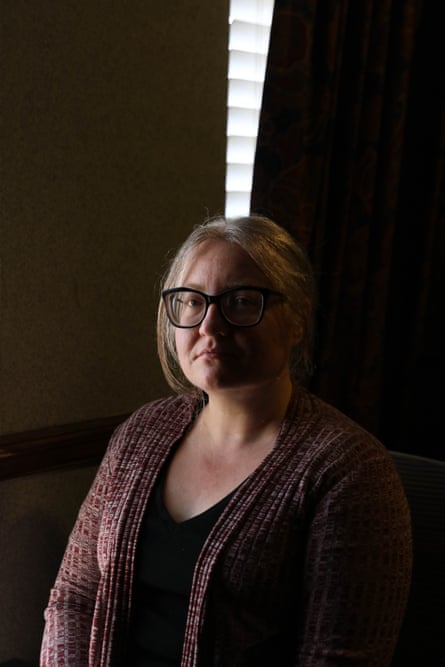
And so the clinic survived a little longer. But it wouldn’t be long before legislators found another angle from which to stop its services.
Two events defined the lives of Torres’ parents, as far as Torres sees it. Her dad, a first-generation American from a Mexican family who grew up in 1940s Michigan, was so tormented by bullies that by the time he was five, he had forced himself to forget how to speak Spanish. Torres, who is adopted, studied languages during her undergraduate studies. She is now a fluent Spanish speaker, but her dad cannot converse with her in his native tongue.
And when Torres was about eight or nine years old, her mom, a chief nursing officer in a Michigan hospital, fought a sexual harassment case at work. Torres was too young to understand what happened, just that it involved male colleagues using inappropriate language of a sexual nature around her mother, and that after her mom raised the issue, she lost her job. Torres’ mother sued the company, and had to relocate for work.
Torres took one lesson from these stories: that at some point in her life she would face discrimination, and that you always fight for what is right.
As a kid, she waited for the moment the discrimination would happen. “I remember being a little girl and being ready. But that just kind of never happened. No boy had the audacity to say to me, ‘Girls can’t play baseball.’ It was always more subtle than that,” says Torres.
She decided she was going to become an OB-GYN in college after learning about a study on uterine cancer in which all of the subjects were men.
“Cue the laughter,” says Torres, rolling her eyes, as she does frequently. “I was just like, ‘Well, shit!’ I mean, I knew women’s health was underserved … But that’s when I became fascinated with historical misogyny, specifically in medicine. And I said, ‘Well, I gotta change that.’”
Being an abortion provider felt like a good place to start. In 2012, she was sent to Utah so she could further specialise through a fellowship, which is where she started to develop her activist chops.
“I was doing abortions in a red state. You’re fighting all these legislators … It was a high anti-abortion bill time,” she says, describing a fetal pain bill that she fought tooth and nail to keep off the books during her residency.
On the wall of her office hangs a cartoon by the Salt Lake Tribune’s Pat Bagley, in which he depicts Torres fighting the bill. The cartoon shows a Utah legislator giving a medical demonstration while using the children’s game Operation while preaching to the doctors. “At no point in the procedure must the metal thingy touch the other metal thingy inside the woman’s thingy,” the legislator explains.
The meeting never took place – the cartoon is satire. But Torres’ portrayal, her eyes deeply embedded in the back of her eyeball sockets, groaning in despair, is true to life.

“Legislators are notoriously not trained in medicine. I don’t think it’s appropriate they’re tying our hands and dictating how to provide care to those of us who are trained and licensed,” she says.
With her patients, Torres is very different from the argumentative doctor depicted in cartoons or on social media. She has a gentle demeanor. She leans back in her seat, her clogs neatly poking out from her scrubs, while she explains STI care, or takes time to discuss different birth control options. She lets patients know their rights – which includes their right not to take a single bit of her advice if they do not want to. She spent most of 2021, during her license suspension, updating the clinic’s administrative practices to ensure no patient is turned away from care because of financial issues.
Her reason is simple.
“If I don’t do this work, who’s going to?” she asks.
By the time Torres was in her 30s, the fight she had long been anticipating finally found her. On the way to a conference in Australia, someone sent her an antagonizing tweet, asking her if she heard the screams of the fetuses she aborts.
She hastily fired off a response.
“You know fetuses can’t scream, right? I transect the cord 1st so there’s really no opportunity, if they’re even far enough along to have a larynx. I won’t apologize for performing medicine. I’m also a ‘uterus ripper outer,’ if that’s how you’d like to describe hysterectomy,” she wrote.
By the time she’d landed, it had gone viral. Former Breitbart editor Ben Shapiro shared the tweet, comparing Torres to a James Bond villain. Conservative news outlets like the Daily Caller covered it, misinterpreting it to read that Torres cut vocal cords (which is not part of any standard abortion procedure), when she meant the umbilical cord. People started pulling out of the Australian conference at which Torres was scheduled to speak.
When I ask Torres about this incident, multiple times over several days, she is conflicted. Often, she shrugs it off, and many times she tells me she doesn’t regret sending the tweet.
She was incensed, she says, that the US debate over abortion had come to revolve so much around humanizing the fetus, and not the person carrying the fetus. For her, it was obvious that she wasn’t going around cutting vocal cords. She was angry that bad faith actors seemed to be suggesting – to her, a doctor – that her job involved murdering screaming babies.
She had come to view that the reaction to her tweet as almost inevitable: at some point, rightwing pundits and commentators were going to find some way to publicly demonize and flog her.
I tell her the tweet might read as harsh, unthinking even – and not just to anti-abortion advocates.
“Knowing what transpired, I would have worded it differently. There was more of an emotional reaction in my post than normal,” she says. “Part of me wonders, why did I even respond? Normally I don’t respond to nonsense like that. I think I did because I’d been punched in the face so many times. I was like, ‘I’m done getting punched in the face.’”
Torres compares herself to Bruce Banner, the nerdy physicist whose alter ego is the Hulk, a raging brute with superhuman strength. When I ask her why it took her so long to see why people reacted so strongly to her tweet, she softens. “I’m always angry. I think I’m in a state of anger and rage. And I won’t allow myself to be vulnerable at times,” she says.
After her viral moment, Torres deleted the tweet. The next week, she was on a flight back to Utah. A few days later, after having been directed not to come into work, she was called to a meeting in a generic-looking conference room she’d never been to before, on the edge of town. An HR person she didn’t know handed her a mutual separation agreement and told her: sign it and you’ll get three months’ severance, or don’t and leave without pay.
She was later chaperoned into her old office to collect her belongings – a mortifying moment in which not a single colleague would look her in the eye. “It felt like I was a criminal. Like I had laundered money or something,” she recalls.
Torres would later sue the Daily Caller for defamation, alleging it had misinterpreted her tweet. The article written about her, and many since, indeed claimed she was referring to vocal cords, which are plural, and not what Torres says she was referencing.
She was awarded $40,000 in damages, and the outlet issued a correction, but she never received an apology. After that, Torres couldn’t find full-time work for a year, until she was offered a job in New Mexico. She refers to that time in her life as a “corporate medicine nightmare”.
She held on for a year, until Robin Marty called her in March 2020 to ask if she would be interested in being the main doctor at an abortion clinic in a different state. She didn’t even wait to hear where the clinic was before she said yes.
Torres was barely practicing in Alabama for two weeks before the state took away her license. Bobby Segall, whom she describes as a “rootin’ tootin’ Alabama lawyer”, with a moustache like Albert Einstein and a head of thick white hair, took on Torres’ case against the Alabama state medical board.
In deposition, he guided Torres to remain polite and patient as the state listed its charges against her: mainly fraud, for allegedly incorrectly answering statements on her application for a medical license. Torres was accused of lying about a medical malpractice case; lying about her mental health; lying about ever having had her staff privileges revoked; giving incorrect dates of employment; and lying about intending to treat Covid-19 patients.
Another accusation was added later: that she had made “public statements related to the practice of medicine which violate the high standards of honesty, diligence, prudence, and ethical integrity demanded from physicians licensed to practice in Alabama”. Torres and her lawyer had no doubt this was related to her 2018 tweet.
Torres was not found to have committed any wrongdoing in that malpractice case, and the issue was settled out of court. As for her 2018 tweet, she stated: “[My] comments were deliberately misconstrued by anti-abortion activists … These activists and certain media figures fanned the flames of this false controversy until I became the subject of serious harassment and threats on the internet and through calls to my workplace.”
And then Torres waited. She paid her legal fees in dribs and drabs as the invoices piled up. She was always in the red, but promised the lawyers she was good for the money. She made a point of annotating the margins of the thin white paper bills in her messy, compact scrawl, trying to keep track of what was coming and going.
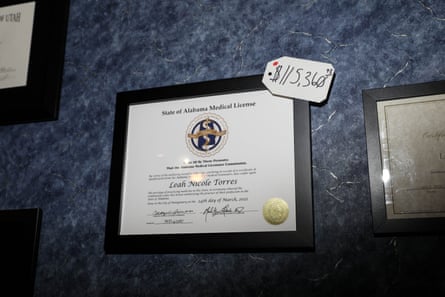
Seven months later, her license was given back, with insufficient evidence found that she had violated the standards doctors are asked to adhere to.
The committee who reviewed the case did not endorse the board’s allegations against Torres, although the report concluded that elements of her answers “were suggestive of deceptive answers and a lack of ethical integrity expected of practicing physicians in Alabama”. As a result, she was instructed to take a $4,000 ethics course.
When the case was removed from the national databank that holds information on medical malpractice against doctors, the following explanation was soberly put: “The action was reversed because the original action should never have been taken.”
While the Alabama state medical board gave Torres her license back, it never repaid her legal costs, nor did it compensate her for the months of wages she had to forgo during the seven months it took to reach a verdict on her case. The fees totalled $115,360.93.
Marty fundraised to pay almost half of Torres’ fees using donations from the public, and Torres’ savings were used to deal with the rest. The emotional, financial and physical toll on her has been huge.
Certainly, the treatment of other doctors since Torres’ temporary suspension might put any doctor off becoming an abortion provider. Dr Caitlin Bernard, an OB-GYN in Indiana who went public about a 10-year-old rape victim traveling to her state for her abortion to escape Ohio’s ban, is also currently under investigation by her state’s medical board. She was first accused of lying, and then of breaking doctor-patient confidentiality laws when she chose to speak out. Bernard denies this.
From where they stand, neither Bernard nor Torres have been accused because they broke a law or endangered a patient. One thing singled each of them out: how loudly they were arguing against the destruction of abortion care in the US.
Rawlings, the former clinic escort, drives past the West Alabama Women’s Center almost every day on her way to work. These days, the sight makes her feel she has lost a long battle. There used to be white poles erected outside the clinic to keep protesters within a designated area. Now they are gone, alongside the many people she usually saw outside the clinic, come rain, shine or pandemic.
“In the past, I would drive by and see friends I had volunteered with, sitting out there on lawn chairs. Back then, there was struggle, but you got a sense that we were winning,” she said. “Now the place is just empty.”
She doesn’t miss the protesters, she says, but their absence is the ultimate signal that they won.
With the seven months of closure that came after Torres’ license suspension, the clinic was fast in the red, and had to lay off a slew of staff.
Fifteen months later on 24 June 2022, Alabama’s Human Life Protection Act was finally able to come into effect after Roe v Wade was overturned. Now a busy day at the clinic might mean seeing seven patients, though the clinic previously saw sometimes a hundred patients in a week.
Marty, the operations director, believes Torres’ license suspension was just another way to prevent abortions from taking place in Alabama, before the overturning of Roe put most abortions fully on hold for the foreseeable future .
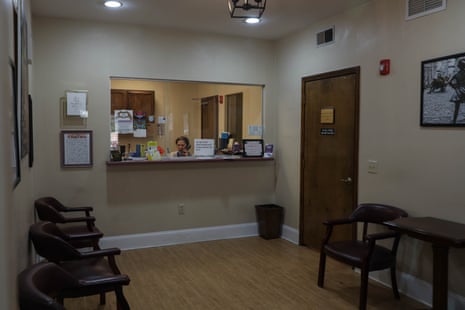
But Torres’ predicament might become an increasingly common reality for doctors who continue to provide abortions in conservative states – where people will continue to need abortion care in the circumstances they are allowed to – like when they spontaneously miscarry, or go to the ER with life-threatening complications.
“This is what bullying looks like. This is the mob. The far-right, theocratic, Christian nationalist mob,” says Marty. She pauses.
“This is what [anti-abortion] states do. And Alabama hates abortion. This is a tactic that is going to be used on other abortion providers in hospitals, in states that still have care. Everything that happens on abortion, happens in Alabama first,” she says.
In Marty’s view, the state was always looking for a way to be able to shut down the clinic, knowing that it was the most productive one in the state. “They figure out the one pressure point that has the most power over an entire state. Their entire mission is how to hold the most power with the least amount of people,” she says.
They may have finally found that pressure point.
Asked how long the clinic can hold on financially before it has to close, Torres estimates until maybe June.

